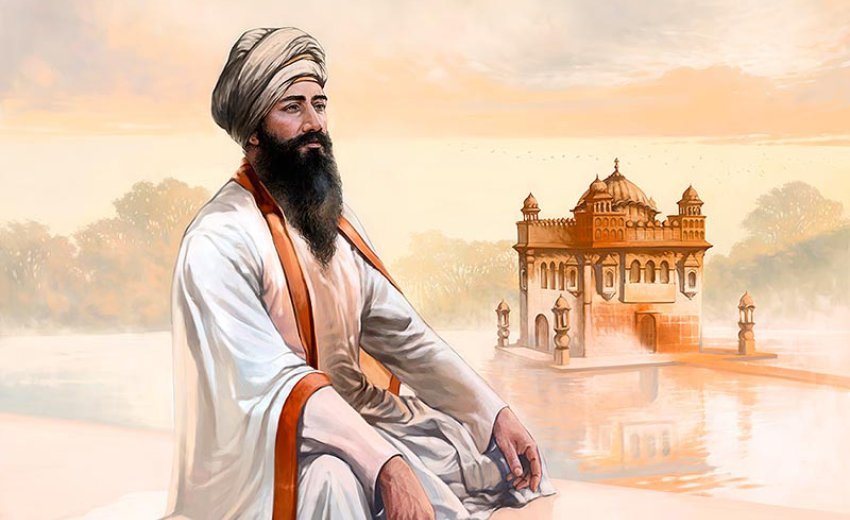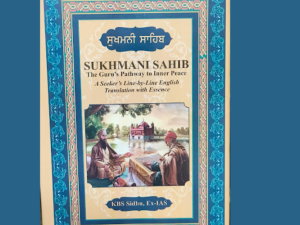ਚੁੱਪ
ਖੁਦ ਵਿੱਚ ਇੱਕ ਬ੍ਰਹਮੰਡ ਹੈ।
ਉਸ ਚੁੱਪ ਦੇ ਕੇਂਦਰ ਵਿੱਚ—
ਇੱਕ ਨਾਮ
ਧੀਰਾ, ਅਟੱਲ, ਪੱਥਰ ਵਾਂਗ ਨਿਰਵਿਕਾਰ—
ਤੇਗ਼ ਬਹਾਦਰ।
ਇਹ ਕਹਾਣੀ ਸਿਰਾਂ ਦੀ ਨਹੀਂ,
ਵਿਚਾਰਾਂ ਦੀ ਹੈ।
ਜਿੱਥੇ ਧਰਮ ਰੂਪ ਨਹੀਂ,
ਸਾਹ ਵਾਂਗ ਹੈ—
ਅਦ੍ਰਿਸ਼ਟ, ਪਰ ਜੀਊਣ ਲਈ ਲਾਜ਼ਮੀ।
ਉਹ ਖੜੇ ਸਨ
ਮੱਧ ਵਿਚ ਮਨੁੱਖਤਾ ਦੇ ਡੋਲਦੇ ਪਾਸੇ,
ਜਿਵੇਂ ਕੋਈ ਯੋਗੀ
ਇੱਕੋ ਸਮੇਂ ਅਕਾਸ਼
ਅਤੇ ਧਰਤੀ ਨੂੰ ਸਾਹ ਵਿਚ ਰੱਖੇ।
ਨੇਤਰਾਂ ਵਿੱਚ ਸ਼ਾਂਤੀ ਸੀ—
ਅਸੀਮ ਤਪ ਦੀ,
ਉਹ ਸ਼ਾਂਤੀ ਜੋ ਤਲਵਾਰ ਨੂੰ ਵੀ ਨਮ੍ਰ ਕਰ ਦੇਵੇ
ਅਤੇ ਕਾਲ ਨੂੰ ਚੂਪ।
ਦਿੱਲੀ ਦਾ ਚਬੂਤਰਾ
ਇਤਿਹਾਸ ਦਾ ਮੌਨ-ਸੰਨ ਕਤਰਾ ਸੀ—
ਜਿੱਥੇ ਇੱਕ ਸਿਰ ਡਿਗਿਆ
ਮਗਰੋਂ ਧਰਮ ਅਸਮਾਨ ਵਾਂਗ ਅਡੋਲ ਹੋ ਗਿਆ।
ਮੌਤ ਉਥੇ
ਹਾਰ ਨਹੀਂ,
ਇੱਕ ਦਸਤਖ਼ਤ ਸੀ—
ਸੱਚ ਦੇ ਪਰਵਾਨੇ 'ਤੇ।
ਚੁੱਪ ਨੇ ਉਥੇ ਬੋਲਿਆ
ਜਿੱਥੇ ਸ਼ਬਦ ਬੇਸਹਾਰਾ ਸਨ।
ਤੂੰ ਸ਼ਹੀਦ ਨਹੀਂ ਕੇਵਲ,
ਤੂੰ ਇੱਕ ਪ੍ਰਸ਼ਨ ਹੈ—
ਅਸੀਂ ਕਿਸ ਮੁੱਲ ਤੇ ਸੱਚ ਬਚਾ ਸਕਦੇ ਹਾਂ?
ਕਿੱਥੇ ਵਿਚਾਰ
ਜੀਵਨ ਨਾਲੋਂ ਵੱਡਾ ਹੋ ਜਾਂਦਾ ਹੈ?
ਤੇਰੈ ਨਾਮ ਨਾਲ
ਮਨ ਵਿਚ ਇੱਕ ਨਦੀ ਚੱਲ ਪੈਂਦੀ ਹੈ—
ਗਹਿਰੀ, ਨੀਲੀ, ਅਧਰਾਤ ਵਰਗੀ,
ਜਿਥੇ ਡੁੱਬ ਕੇ ਪਤਾ ਲੱਗਦਾ ਹੈ
ਕਿ ਜੋ ਅਮਰ ਹੈ
ਉਹ ਸ਼ਰੀਰ ਨਹੀਂ—
ਵਿਚਾਰ ਹੈ।
ਗੁਰੂ ਤੇਗ਼ ਬਹਾਦਰ—
ਇੱਕ ਨਮਨ
ਸ਼ਾਂਤੀ ਦੇ ਸਰੂਪ ਨੂੰ,
ਅਤੇ ਉਸ ਹਿੰਮਤ ਨੂੰ
ਜੋ ਚੁੱਪ ਵਿੱਚ ਚੀਖਦੀ ਨਹੀਂ,
ਪਰ ਸੰਸਾਰ ਨੂੰ ਸੁਣਾਉਂਦੀ ਹੈ।
Silence
khud vich ikk brahmand hai.
Us chupp de kendar vich—
ikk naam,
dheera, atall, patthar vaang nirvikaar—
Tegh Bahadur.
Ih kahaani siraan di nahīn,
vichaaran di hai.
Jithe dharam roop nahīn,
saah vaang hai—
adrisht, par jeeun lai laazmi.
Oh kharre san
madh vich manukhtaa de dolde paase,
jiven koi yogi
ikko samēṁ akaash
ate dharti nu saah vich rakhke.
Netraan vich shaanti si—
aseem tap di,
oh shaanti jo talvaar nu namr kar deve
ate kaal nu chupp.
Dilli da chabootra
itihaas da maun-sann katra si—
jithe ikk sir diggia,
magron dharam asmaan vaang adol ho gaya.
Maut uthe haar nahīn,
ikk dastkhat si—
sach de parvaane ’te.
Chupp ne uthe bolia
jithe shabd besahaara san.
Tu shaheed nahīn keval,
tu ikk prashan hai—
asin kis mull te sach bacha sakde haan?
Kithe vichaar
jeevan naalon vadda ho jaan da hai?
Tere naam naal
man vich ikk nadi chall paindi hai—
gehri, neeli, adhraat wargi,
jithe dubb ke pata lagda hai
ki jo amar hai
oh shareer nahīn—
vichaar hai.
Guru Tegh Bahadur—
ikk naman
shaanti de saroop nu,
ate us himmat nu
jo chupp vich cheekhdi nahīn,
par sansaar nu sunaaundi hai.
Message as Silence
Silence is a universe unto itself.
At its still centre rests a name—
resolute, unmoving,
stone-calm, unshaken—
Tegh Bahadur.
This is not a tale of severed heads,
but of ideas.
Where faith takes no form,
but breathes like air—
unseen, yet essential to life.
He stood
at the wavering centre of humanity,
like a yogic sage
holding both sky
and earth within a single breath.
His eyes held a serenity—
forged through boundless discipline,
a calm capable of gentling the sword
and quieting Time itself.
Delhi’s scaffold
was a mute, desolate shard of history—
where a head fell,
and faith rose,
firm as the sky.
Death there
was not defeat—
it was a signature
on the covenant of Truth.
Silence spoke in a place
where words stood helpless.
You are not merely a martyr;
you are a question—
At what price can truth be safeguarded?
Where does an idea
grow larger than life itself?
At your name,
a river begins to flow within—
deep, blue, nocturnal.
In its depths, one discovers
that what is eternal
is not the body,
but the Idea.
Guru Tegh Bahadur—
a salutation
to the very form of peace,
and to that courage
which does not scream in silence
yet makes the whole world listen.
Dr. Jasbir Singh Sarna’s “Chupp da Sandesh” (“Message of Silence”) is a contemplative meditation on the martyrdom of Guru Tegh Bahadur. This work interprets the Guru not merely as a historical figure but as an enduring philosophical question, a moral axis around which the value of truth, freedom of conscience, and the interior discipline of silence revolve.
The translation aims to preserve the poem’s metaphysical imagery, ethical intensity, and its use of silence as both a spiritual and political metaphor.





